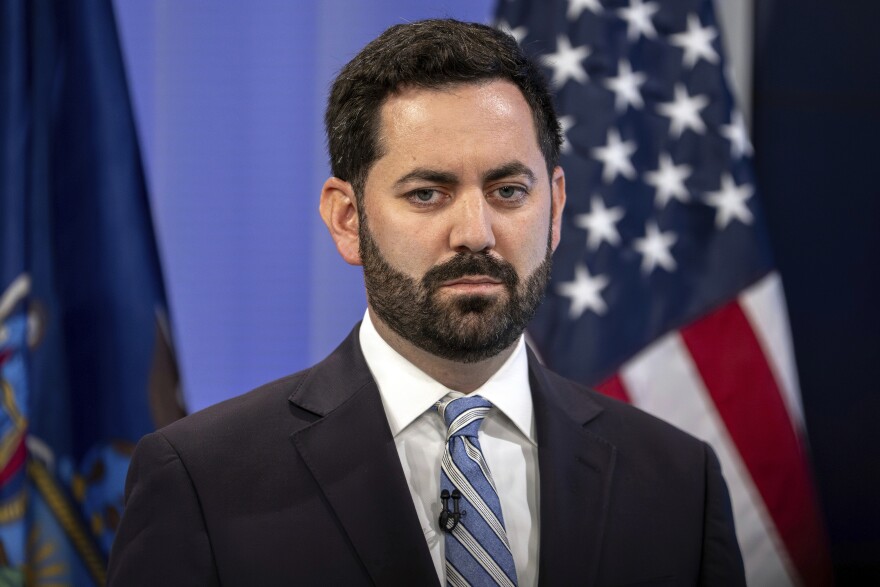Republicans are cheering tax cuts in the recently approved federal fiscal package, hoping more money in voters’ pockets outweighs any changes to the health care system prompted by the law’s funding cuts.
GOP Rep. Mike Lawler attempted to go on the offense during an event in Yorktown on Friday. The swing-district representative touted his advocacy to increase a popular federal deduction for state and local taxes. He was frequently heckled and booed.
The tax-and-spending bill signed last month by President Donald Trump extended many provisions of his 2017 tax law, including lower rates and a higher standard deduction. The legislation, which Republicans call the “One Big Beautiful Bill,” also increased the child tax credit and added a new $6,000 deduction for people over 65.
Lawler mostly focused on the state and local tax deduction, or SALT. Prior to 2017, New Yorkers could deduct their municipal and school property taxes as well as income taxes they paid to the state from their federal income. The 2017 tax law capped that deduction at $10,000. The new law raises the limit to $40,000 for people reporting income less than $500,000.
Democrats and Republicans from New York and other high-cost states, including New Jersey, have spent seven years fighting the SALT limit. Crystal Hawkins Syska, president of the Hudson Gateway Association of Realtors, said the average property tax bill in Westchester County is $17,000.
“That means the cap placed on SALT deductions back in 2017 — just $10,000 — it left many of our neighbors paying federal taxes on that money that they’ve already paid in local taxes. In plain terms, we’re being taxed twice,” she said.
Lawler called the higher SALT limits a “historic victory.” He said it would mean 90% of his lower Hudson Valley constituents could deduct all of their state and local taxes.
“This is not a giveaway to millionaires and billionaires — despite what some of you may believe,” he said to a restive crowd at a town hall. “This relief is targeted squarely at middle and working-class families in high-cost areas like ours.”
The nonpartisan Institute on Taxation and Economic Policy estimates that New Yorkers will pay roughly $15.2 billion less in federal taxes as a result of the legislation, compared to a simple extension of the 2017 law. Around 43% of those benefits would flow to the top 5% of tax filers — people reporting at least $406,600, according to the group.
Democrats have honed in on the disproportionate benefit to the wealthy. U.S. Rep. Paul Tonko, a Democrat who represents the Capital Region, said lower rates in the highest tax brackets should not have been renewed.
“The tax policy could've been far better,” said Tonko, who joined all Democrats in voting against the bill. “We wouldn't have to blow a deficit of $4 trillion into our budget, into our economy and we wouldn't have had to cut essential programs if we had done this correctly.”
He traveled last month to Plattsburgh to discuss the bill alongside U.S. Rep. Alexandria Ocasio-Cortez, who represents parts of Queens and the Bronx. The two focused on cuts on funding to Medicaid, which provides health care coverage to more than a third of New Yorkers.
Hospital groups say the new law will reduce funding for hospitals by $8 billion, and could prompt thousands of job losses. Additionally, Gov. Kathy Hochul’s administration estimates that 1.5 million people will lose state-backed health insurance due to new eligibility requirements. The Democratic governor’s top fiscal aide says the law will increase the next year’s state budget deficit by $3 billion.
Lawler said the new provisions are designed to prevent waste, fraud and abuse of the Medicaid program.
It remains to be seen how the law will play out in next year’s congressional and state elections. A Siena College Research Institute poll released in early July found 52% of voters believed the tax-and-spending law would worsen life for a majority of Americans, compared to 28% who thought it would improve conditions.
The same poll found 35% of respondents favored keeping the SALT deduction at $10,000, while 32% opposed it.
Both sides are already seizing on the bill’s various provisions. Hochul has traveled to Republican areas to talk about Medicaid cuts. Lawler’s Friday event was an early attempt by GOP state lawmakers to build support for the bill.
The press conference was moved from a private residence after progressive activists began organizing a protest, according to a Lawler aide. More than a dozen people opposing the law attended the press conference at a nearby municipal building. Several held signs protesting the cuts to Medicaid.
Lawler and several other elected officials talked through the jeers. As he left the rostrum, the congressmember responded directly to someone who heckled a new provision exempting some tips from income taxes.
“Tell that to the people who will benefit — that you don’t care, that you think it’s horrible,” Lawler said. “I appreciate that you all came. Every one of you will benefit from this tax bill, so you’re welcome. And thank you for being here.”



